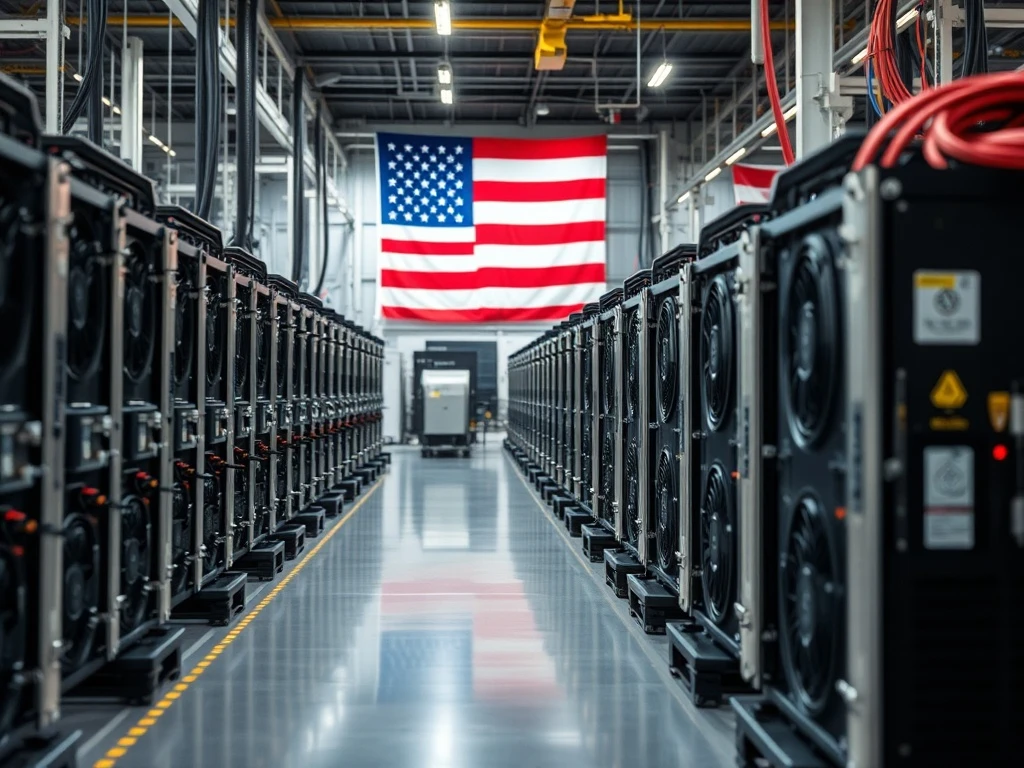Strategic Leap: Canaan Boosts Bitcoin ASIC Production in US, Exits AI Business

The world of cryptocurrency mining is buzzing with significant news as Canaan, a prominent player in the Bitcoin ASIC production landscape, embarks on a bold strategic pivot. This move involves initiating pilot production within the United States and, notably, divesting from its artificial intelligence (AI) chip business. This realignment signals a clear focus on its core strengths within the burgeoning crypto infrastructure sector.
What’s Driving This Pivotal Bitcoin ASIC Production Shift?
Canaan’s recent announcement confirms the successful completion of a pilot production run in the US, effectively replicating its established operations in Malaysia. This isn’t just a minor adjustment; it’s a calculated decision by the Bitcoin ASIC producer. While acknowledging the inherently higher production costs associated with manufacturing in the US, Canaan views this initiative as a critical strategic investment in long-term resilience rather than merely a response to current tariffs.
The benefits of this domestic shift are multifaceted:
- Improved Delivery Cycles: Producing closer to the North American market significantly shortens logistics and delivery times.
- Faster Response to Demand: Proximity allows for quicker adaptation to local market needs and customer requirements.
- Geopolitical Navigation: It provides a crucial hedge against future geopolitical or regulatory uncertainties, offering greater supply chain stability.
This move positions Canaan to better serve one of the largest and most dynamic crypto mining markets globally, reinforcing its commitment to its clientele.
Canaan US Expansion: A Long-Term Vision or Immediate Response?
While tariffs certainly play a role, Canaan emphasizes that its US expansion is part of a comprehensive, long-term effort. The company is actively working to optimize its US cost structure, aiming to limit overall production expenses. Currently, products manufactured in Malaysia face a 10% tariff when imported into the US, creating an additional layer of cost and complexity. Furthermore, tariffs on imported components and raw materials often lack clarity, complicating expense planning for manufacturers.
Canaan’s ultimate decision to expand US production hinges on achieving commercial viability. This will be determined by a combination of effective cost management, robust customer demand for US-made mining hardware, and greater clarity surrounding the tariff environment. This strategic foresight highlights a proactive approach to market dynamics rather than a reactive one.
Focusing on Core Crypto Mining Operations: The AI Exit
In a parallel and equally significant move, Canaan announced the discontinuation of its AI semiconductor business. This strategic realignment is designed to sharpen the company’s focus, allowing it to dedicate all its resources and expertise to its core strengths in crypto infrastructure and Bitcoin mining operations. Nangeng Zhang, chairman and CEO of Canaan, articulated this decision clearly, stating, “I believe that doubling down on our core strengths in crypto infrastructure and Bitcoin mining is the most strategic path forward for Canaan.”
This singular focus could allow Canaan, which currently controls approximately 2.1% of the Bitcoin mining ASIC market, to innovate more rapidly and efficiently within its specialized niche. By shedding the AI segment, Canaan aims to streamline its operations and enhance its competitive edge in the highly specialized world of Bitcoin mining hardware.
Navigating Mining Hardware Tariffs and Compliance Concerns
The decision to bring production closer to the US market also addresses potential concerns over national security standards and import regulations. Canaan has affirmed that its devices shipped to the United States from Malaysia are certified by local authorities. Should the company expand its US production further, it intends to ensure full alignment with evolving US standards for technology and security.
This commitment to compliance is particularly pertinent given recent industry events. For instance, the US Customs and Border Protection Agency temporarily halted the delivery of thousands of Bitmain ASICs in November 2023. This action followed an investigation into Chinese chip designer Xiamen Sophgo over an alleged business relationship with US-sanctioned telecommunications firm Huawei, with the devices only recently released. Such incidents underscore the increasing scrutiny on supply chains and the importance of adhering to geopolitical and regulatory frameworks when dealing with advanced mining hardware.
The Broader Trend: A Shift in Mining Hardware Manufacturing
Canaan’s move is not an isolated incident. Recent reports indicate that other major Bitcoin ASIC producers, including Bitmain and MicroBT, are also exploring or implementing plans to bring some of their production to the US. This collective shift suggests a broader industry trend towards diversifying manufacturing bases and strengthening supply chain resilience, particularly in response to evolving global trade policies and geopolitical considerations. The quiet ascent of at-home Bitcoin mining, for example, could also benefit from more localized production, making mining hardware more accessible and reliable for individual miners.
Summary: A Resilient Future for Bitcoin ASIC Production
Canaan’s strategic pivot, marked by its pilot US production and exit from the AI chip business, signifies a determined effort to fortify its position in the Bitcoin mining industry. By focusing intently on its core crypto mining operations and establishing a foothold in US manufacturing, Canaan aims to enhance delivery cycles, respond more agilely to market demands, and navigate complex geopolitical landscapes. This move, alongside similar initiatives from other major players, underscores a collective industry drive towards greater resilience and localization in the production of essential mining hardware. The future of Bitcoin ASIC production appears to be moving towards a more diversified and strategically robust global footprint.










